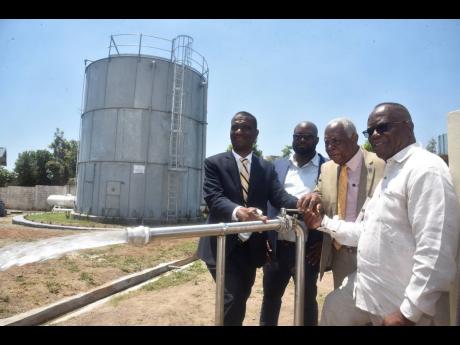The Mico well ahead in water game
The well-grassed condition of the sport field at The Mico University College, St Andrew, on Thursday, compared to 2012 when its dustbowl condition led to it being referred to as ‘The Sahara’ by staff and students alike, so impressed President Dr Asburn Pinnock, that he was moved to refer to it as a watershed moment.
Further, he admitted that the conditions that led to this remarkable transformation were achieved against incredible odds.
“When the concept of the well was first seeded seven years ago, for some it seemed like a pipe dream (all puns intended), something which could and would never happen. Yet here we are today, officially commissioning The Mico Independent Water Resource Solution, a project and a product which will redound to the benefit of The Mico and the wider community,” he declared.
Occasion was the commissioning of 240-ft well with a daily abstraction capacity of 381 cubic metres (100,700 gallons), which will allow the institution to provide its own sustainable supply of potable water, with a projection to eventually produce its own brand of bottled water, as well as supply truck water to external users.
The Mico is now officially off the National Water Commission’s system and is entirely dependent on water from its well.
The fact that this was accomplished in the face of a prolonged and intense drought affecting the country was particularly pleasing to Dr Pinnock, who admitted that it was the adverse impacts of this situation which drove them to find a solution.
“I took up office at The Mico, when the country was in a state of drought. Some sections of the campus were like a dust bowl and the field on the west side of the gymnasium was called ‘The Sahara’. We spent a lot of money purchasing water, but we were determined to find a solution. With the reality of global warming and climate change, droughts have become increasingly severe, and there are times when we struggled to provide water for the full functioning of the institution,” he explained.
In the years before the COVID-19 pandemic, The Mico was spending $39 million a year on average for water supplied by the National Water Commission (NWC). Now it is able to maintain the lush beauty of its lawns and fields, even during periods of intense drought. This has been possible because of a complex subterranean sprinkler system, which utilises water from the well.
“For us, visionary thinking is part of our arsenal and so while we prayed and hoped we embarked on the research, did the cost/benefit analysis, and moved to planning and the execution to make it a reality,” he proudly declared.
Hiccups along the way
Meanwhile, Trustee of the Lady Mico Trust, Karl James, spoke to the fact that there were some hiccups along the way, but the institution remained steadfast in its commitment to the project.
“The completion is a manifestation of forward thinking, in-depth research and planning, engineering genius, hard work and tenacity of purpose. All of this has been undergirded by the financial support of the Mico Foundation and The Lady Mico Trust. This is critically important because oftentimes the best and most novel ideas remain as ideas on paper, in the absence of funding to move from blueprint to actual execution,” said James..
“There have been points on the journey when a reduced intake of students resulted in significantly reduced inflows to our coffers, and this has had serious impact on the operations of the institution. The challenge to meet the obligations of regular utility bills, mainly electricity and water, are not alien to many institutions, including The Mico, but the institution has always demonstrated creativity and resourcefulness, and where necessary, applied appropriate cost- saving mechanisms,” he added.
James admitted that they knew from the beginning that a project of this magnitude would be an expensive venture, but had no hesitation in partnering with The Mico Foundation for its execution.
Drilling of the well started in July 2017 and was completed in October that year and it was constructed at a cost of $110 million. Constructed by Jamaica Wells and Services limited, its irrigation system is powered by a 24-horse-power pump.


